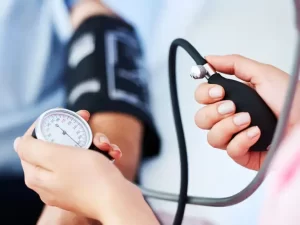If you suffer or know someone who suffers from high blood pressure, these 7 best tips on how to lower high blood pressure are for you!!


What is Blood Pressure?
Blood pressure is the force of blood against the walls of arteries as the heart pumps it around the body.

Join our Telegram Channel for Updates
It is typically expressed as two numbers: the systolic pressure over the diastolic pressure. Systolic pressure represents the force when the heart contracts, while diastolic pressure is the force when the heart is at rest between beats.
What is High Blood Pressure?
High blood pressure, also known as hypertension, occurs when the force of blood against the artery walls is consistently too high.
An increase in the pressure of the blood often develops over many years and can lead to serious health problems, such as heart disease, stroke, and kidney damage. It is often referred to as a “silent killer” because it may not cause noticeable symptoms, but it can progressively damage the arteries and organs.
Factors that Contribute to the increase in the pressure of the blood
Several factors contribute to high blood pressure, including
- genetics,
- age,
- diet,
- lack of physical activity,
- certain health conditions.
7 Best Tips On How To Lower High Blood Pressure
Simple exercise and Walks
Engaging in regular walks and exercise is a highly beneficial practice for reducing elevated blood pressure. Consistent physical activity enhances the strength and efficiency of your heart, facilitating improved blood circulation and subsequently reducing the pressure within your arteries.
Lower amount of Salt intake
Lowering your sodium intake is important. Across the globe, people consume high amounts of salt, mainly due to the increased consumption of processed and prepared foods. Numerous studies have established a connection between elevated salt intake and health issues such as high blood pressure and cardiovascular events, including strokes.
Quit Smoking
If you smoke, it’s advisable to contemplate quitting. Quitting smoking is crucial as it is a significant risk factor for heart disease. Each puff of cigarette smoke leads to a brief, but noticeable, increase in the pressure of the blood.
Do not Over Work
Learn to handle stress effectively, as it plays a significant role in causing the pressure of the blood to become high. Chronic stress keeps your body in a continuous fight-or-flight mode, resulting in a quicker heart rate and narrowed blood vessels on a physical level.
Take Less Alcohol
Consume less alcohol, as drinking can elevate the pressure of the blood and heighten the risk of various chronic health conditions.
Reduce Caffeine Intake
Reduce your caffeine intake. Consuming caffeine, such as in a cup of coffee before getting the pressure of the blood measured, can lead to an immediate increase in pressure.













